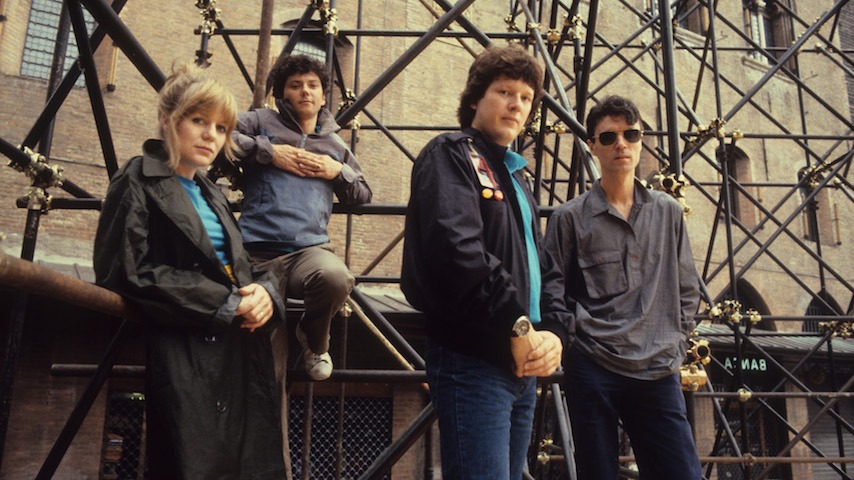Welcome to our new Gateways column, where Paste writers and editors explore the taste-defining albums, artists, songs or shows that proved to be personal “gateways” into a broader genre, music scene or an artist’s catalogue at-large—for better or worse. Explore them all here.
For some reason, music that you hear in your teens feels considerably more earth-shattering than music you hear in later periods of life—even if the music itself is the exact same. Perhaps that’s because when you’re a teenager, you may be living as if you’re the protagonist of a coming-of-age movie, just waiting for a band to change your life, or because every tiny thing at that age feels like the end of the world or the beginning of a new one. Maybe it’s because you still have no sense of who you are, and you’re subconsciously looking for a new thing to consume your personality, so as to delay the difficult work of discovering yourself beyond your preferences. Or it could just be that you don’t have a broader understanding of history, culture or, frankly, how the world works, so it’s easier for something to spark immediate awe. Hearing an artist’s music for the first time without being exposed to any works that inspired it or works from their contemporaries often results in a wildly exciting and jarring experience, which is exactly how I felt after stumbling across the debut album from Danish punks Iceage.
The average teenager isn’t acutely aware of DIY punk or their local scene, so their conception of punk is probably something along the lines of The Sex Pistols, The Clash, and even Green Day and Blink-182—or at least that was my conception of punk before I started listening to music obsessively. When I thought of punk, all I imagined was the spiked hair and safety pin fashion of The Sex Pistols, or the kids at my school who were interested in pop-punk, skate culture and eyeliner—which is to say that none of it really appealed to me. I didn’t know this at the time, of course, but thankfully, the Trump-supporting goon John Lydon and his band of misfits, who were nothing more than an empty-minded fashion brand conceived by Malcolm McLaren, never ignited anything within me, and neither did the more emo side of punk, though I have made in-roads since then on the latter.
Before I heard Iceage, I was mostly listening to classic rock and the prominent alternative bands of the mid-to-late 2000s, like Coldplay, The Strokes and Arctic Monkeys—so nothing particularly unconventional. Although I had moments of euphoria with those bands, it wasn’t the same as hearing something completely beyond the confines of my imagination. Hearing New Brigade, the 2011 debut album from Iceage (which celebrated its 10th anniversary this past January), for the first time felt like certain neurons in my brain woke up and started firing. It was almost a feeling of having no idea what to do with this foreign stimuli. This was my first experience of taking in the thrashing rhythms of Iceage. I don’t think I even knew what moshing was at the time, but I felt this very visceral feeling of wanting my entire body to vibrate or launch into something, furious at my inability to nod along to their speedy songs without pinching a nerve.
Although I soon grew to love all aspects of Iceage’s music, Dan Kjær Nielsen’s drumming was the first thing I noticed. How could something sound so loose and precise at the same time? The spring-loaded, circling pounds of “Rotting Heights’’ and “Count Me In” took me on a wild ride, especially because it was the first time I remember hearing a band whose drums were setting the tone, rather than another more commonly dominant element. Their rhythms tripped over themselves in a way that wasn’t clumsy or off-putting—it created this tense drama and made you listen even more intently, in the hopes of mentally locking into a groove for as long as you could until you’d inevitably be thrown off. The excitement of listening to Iceage (particularly their early records) partially derives from their sonic edging—the feeling that the whole thing is going to fall apart at any moment, but never does, leaving you in this liminal space of tension, as if you’re on a long treadmill, desperately trying to evade a bloodthirsty foe who’s not far behind, but has yet to catch you.
After wrapping my head around Nielsen’s drumming, I found myself enraptured by Elias Bender Rønnenfelt’s animalistic, yet sensitive vocals. You could detect his bleeding heart in the songs-not in the mushy, lovey-dovey sort of way, but more like the soldier who leads his battalion in a noble revolution against a squadron of sycophants. Rønnenfelt’s voice isn’t as guttural as other punk singers, instead opting for a theatrical, sensual majesty. Still to this day, Iceage are one of the most theatrical bands I know, given Rønnenfelt’s vocal intensity and their lyrics about betrayal, blood and beauty, all cultivating these poetic, high-stakes scenes of glory.
Lyrics like “Pointlessness in surroundings / Cannot ruin things / Can you keep a promise? / Alliance is our home / We’ll stay together / In brotherhood it shows,” proclaimed over buzzsaw guitars, are one hell of a battle cry, as are the very last lines on the album: “I lie in a pool of spit and fear / But I won’t stay weak or hurt or shattered / Holding on.” The album’s sense of benevolent, shared purpose was profound—moving to the point of tears, even, as you imagine being in the trenches with your brethren in a bleak landscape. The cover artwork for New Brigade is impressionistic, clouded in an industrial gray smoke and stamped with the band’s large “IA” insignia, as if to signify which side you’re fighting for. But beyond its militaristic themes, it was also filled with amorphous desire, one made even more stirring by the fact that the anguish and love they describe sound somewhat fleeting. You could feel that although they spend much of the album describing a pervading visual and societal rot, when they cry, “These days are marked,” something is on the horizon, but you just have to see it through.
Some songs on New Brigade are sonically more difficult to swallow than others, especially on first listen, but Iceage never sound overly grating, either. They may sound ugly, but not ugly ugly. The most pop-oriented song of the bunch, “Broken Bone,” could easily be imagined as a sassy Buzzcocks tune, and others have an ever-so-slight bluesiness, if the sounds were sped up tenfold and shot out of a murky exhaust pipe. Then, of course, there are the barreling hardcore rhythms and grim post-punk textures of early Wire and The Cure. But in some ways, New Brigade also sounds alien, just fragments of the deranged imagination of four young Danes with an artful spirit and an unquenchable thirst for creating the soundtrack to a teenager’s bloody nose at a crappy punk venue.
Some people probably resent Iceage. Though it has eased over time, their artistry is decidedly intense—they’re not the type of band you’d expect to crack a joke in between songs—and they’re an almost distractingly attractive bunch. But I find that Iceage are most powerful when fully immersing yourself in the drama of their songwriting—only then can you forget that the art school-looking members could quit the band at any point to become pouty GQ models. I actually didn’t think I liked poetry until I heard bands like Iceage and did a complete 180. Their bold word choice was filled with the aura of the old world, with possibly the most explicitly modern reference on their debut album being a sewer system. But their songs didn’t feel antiquated, as the universality of the emotional turmoil they describe is quite clear. The songs were filled with claustrophobia, revenge, honor, sickness and moments of embrace, all of it in spite of surrounding devastation. It’s albums like these that make me think, shamefully and probably unrealistically, “Maybe I will come around to musical theater one of these days.”
New Brigade, a record that opens with a stomping, mathematical pulse, ticking like a time bomb, lit a fuse within me, allowing me to digest more strange sounds in the future. Other records I discovered a bit later were Brainiac’s Hissing Prigs in Static Couture and This Heat’s self-titled debut, and I never would’ve been able to make sense of their spastic synth-punk and near-indecipherable experimental rock, respectively, if it weren’t for bands like Iceage. If you want someone to enjoy fish who’s never eaten it before, you probably wouldn’t give them a raw octopus to start. But in a weird way, being thrown into the thick of the foggy post-punk of Iceage’s early records was the kick up the butt I needed to realize that the music I’d been exposed to before wasn’t even the tip of the iceberg, but a measly ice cube.
Lizzie Manno is a music writer, Coldplay apologist, bread lover and Spongebob memer. She’s a former Paste editor, with bylines at Billboard and Cleveland Scene. Follow her on Twitter @LizzieManno




